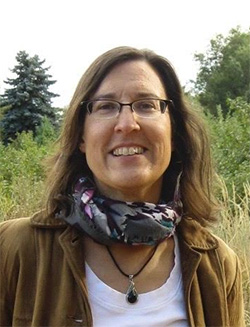Laurie Wagner Buyer: The Heart and the Mind
 (Laurie Wagner Buyer’s several poetry books include Glass-Eyed Paint in the Rain (High Plains Press, 1996), finalist for the Colorado Book Award in Poetry in 1997 and, most recently, Across the High Divide (Ghost Road Press, 2006), winner of the 2007 SPUR Award for best poetry. Her new prose book, Springs Edge: A Ranch-Wife’s Chronicles, appeared in 2008. She was a co-editor of Open Range: Poetry of the Reimagined West.)
(Laurie Wagner Buyer’s several poetry books include Glass-Eyed Paint in the Rain (High Plains Press, 1996), finalist for the Colorado Book Award in Poetry in 1997 and, most recently, Across the High Divide (Ghost Road Press, 2006), winner of the 2007 SPUR Award for best poetry. Her new prose book, Springs Edge: A Ranch-Wife’s Chronicles, appeared in 2008. She was a co-editor of Open Range: Poetry of the Reimagined West.)
(1) I still consider myself primarily a poet, but also someone who writes in all the other genres as well. Words come to me as poetry first and I tend to then translate them into prose.
(2) Well, there are some things that are more easily investigated in prose than in poetry (and vice versa). When the topic or theme is broader and needs more explanation or the story is longer than can be told in a poem, then I reach out for the prose format whether in fiction or non-fiction. It has been fun to expand my vision to longer forms, including essays, full-length memoir, short stories and fiction. Still, underlying the language is the care and attention with words that a poet learns to explore.
(3) I think I tend to write about the same things no matter what genre I write in. Whether poems or prose, I bend toward illuminating the depths of the human heart. I’m intrigued with relationship and connection, with why we fail and how we succeed in being part of a landscape or part of a friendship or a family or a love affair. I don’t think my perspective changes even when I’m using imaginary characters to tell their stories. The heart of it all is somewhat the same.
(4) Poetry, for me, is a pen and paper art. I rarely write first drafts of poems on the computer. Conversely, I rarely write prose on paper, except for an outline or scribbled starting ideas. I’m not sure why it works that way for me, but there seems to be a much slower and concise process with poetry and a much faster, get the words down quickly system with prose.
Part of this, I think, is that poetry is more heart-generated for me and prose is more mind-generated. My revision process is the same for any work because I seem to be able to revise poetry on the computer, though I often print out poems and scribble all over the page, too. At some point, prose, too, must be printed out so I can hold the pages in hand and read as a reader and not a writer. Then I edit as I read along and make changes on the computer later.
(5) In poetry, the greatest challenge is to be fully authentic with voice, in memoir it is the desire to be as truthful as possible, in fiction it is the intricacies of plot. What is most glorious works across the genres: the delight of transforming emotion into words and words into poems and stories. Again, the writing process is about connection and communication, sharing and growing. My most glorious moment is always when a reader says, “You made me cry. You told the story I’ve never been able to tell. You saw into my heart. Thank you.”

